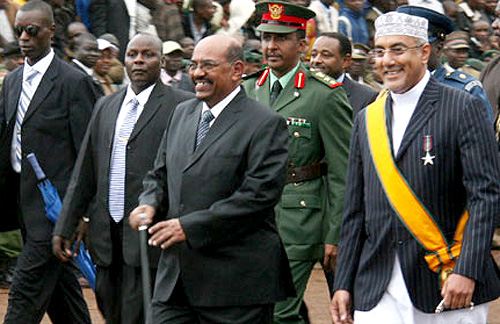
Kenya’s weekend parties were glorious, beyond glorious. And I’ve provided a translation of its unofficial national anthem, Daima Kenya, below.
Swahili translations are very difficult. It’s much easier to translate NPR’s irresponsible reporting.
Some day I won’t start these tirades with the qualifier that “I love NPR,” but I do. I think they’ve just stretched themselves too thin trying to report from Africa. The files are glaring for what they don’t say.
Friday and Saturday I listened with pleasure when NPR headlines reported the Kenya celebrations. So Sunday when headlines reported that Sudan’s President had snuck into the dignitaries box to watch the “promulgation”, my interest peaked.
But in fewer seconds than it takes to close this browser, they managed only to say how displeased President Obama and Kofi Annan were. No further explanation.
There’s an old African expression that goes something like, if you’re prostrate on the ground a tiny little thing right in front of you will obscure the tree that’s crashing down on top of you.
Bashir should have been arrested when he entered Kenya. In fact, the decision to allow him to attend must have been very last-minute, because he didn’t fly into the ordinary international airport, where presumably police and immigration officials have him on a most-wanted list.
Instead, he suffered the indignities of a tourist on a longer flight and smaller cabin by flying into the tiny Wilson Airport which doesn’t handle jets.
Bashir has been indicted by the criminal court in the Hague, no less a world legal authority than Kofi Annan’s United Nations. There is a warrant for his arrest in most countries including Kenya. Virtually all sane minded people – and that definitely includes the Kenyans – agree that he’s a criminal who should be tried for crimes against humanity, specifically in Darfur.
Although The Sudan shares a border with Uganda, Bashir didn’t attend this month’s Organization of African Unity conference, because the Ugandans said they would arrest him.
No one even thought to ask if he were invited this weekend. Since he hadn’t been allowed next door into kissin cousin’s Uganda for the OAU, it was unthinkable!
At least for far, far away radio networks.
I very much respect the International Court and I wish that America would sign on to it, rather than sequester itself with those other moral pillars like China. Bashir should be tried and convicted.
But in January there is going to be a very important election in the southern Sudan, in which we all hope (especially the southern Sudanese) that they will cede from greater Sudan and become a separate nation.
This would end two generations of civil war, stop the unbelievable horror of militias like the Lord’s Resistance Army which have plagued the southern Sudan and Uganda for 30 years, and bring a modicum of peace to this tortured area.
So far, because of Kenya, Bashir has gone along with the process. This in itself is absolutely astounding. And it would not have happened without Kenya’s constant political involvement. And it will not happen if Bashir, as the leader of Africa’s largest land country filled with much of its oil, does not agree right up to the moment that new borders are demarcated and different flags raised simultaneously.
Get the picture? NPR is just radio.
Now to the next translation.
Swahili is an incredibly melodic language, essentially because there are five classes of noun which more or less begin with the same letter, and most every adverb and adjective that refers to that noun must also start with that letter. So you usually have this beautiful sentence with every word sounding a little bit like every other word in the sentence.
That’s music or a poem, and to translate that into a language without that uniformity of sound is really very difficult. Yet that’s really most of the beauty of Daima Kenya: it’s poetic melody.
Really, you can enjoy – you can feel — the message just by listening to the sounds.
So here’s a straight translation:
VERSE 1
Umoja ni fahari yetu
Undugu ndio nguvu
Chuki na ukabila
Hatutaki hata kamwe
Lazima tuungane, tuijenge nchi yetu
Pasiwe hata mmoja
Anaetenganisha
Unity is our pride.
Unity is indeed our strength.
Hatred and racism
We can’t afford.
Everyone is needed
To rebuild this country
Every single person.
CHORUS
Naishi, Natumaini,
Najitolea daima Kenya,
Hakika ya bendera
Ni uthabiti wangu
Nyeusi ya wananchi
Na nyekundu ni ya damu
Kijani ni ya ardhi
Nyeupe ya amani
Daima mimi mkenya
Mwananchi mzalendo
I live, I hope,
I’ll always work for Kenya.
Our flag is my beacon:
Black for the people,
And red for the blood.
Green for the land,
And white for peace.
I’ll always be a Kenyan:
Citizens us all.
Verse 2
Kwa uchungu na mateso
Kwa vilio na uzuni
Tulinyakuliwa Uhuru na mashujaa wa zamani
Hawakushtushwa na risasi au kufungwa gerezani
Nia yao ukombizi kuvunja pingu za ukoloni
For the pain and suffering,
For all the sadness
We won our liberty.
Those heroes of old
Who were shot and imprisoned:
Their purpose was
To break the yolk of colonialism.
Verse 3
Wajibu wetu
Ni Kuishi kwa upendo
Kutoka ziwa Mpaka pwani
Kaskazini na kusini
Our purpose now is
To live with love:
From the lake to the coast,
North and south.